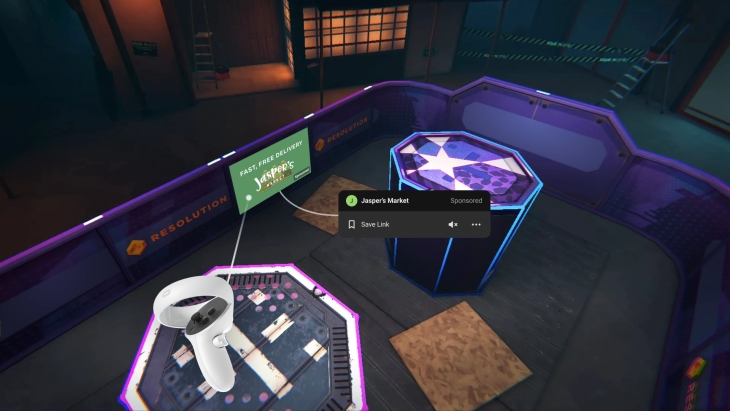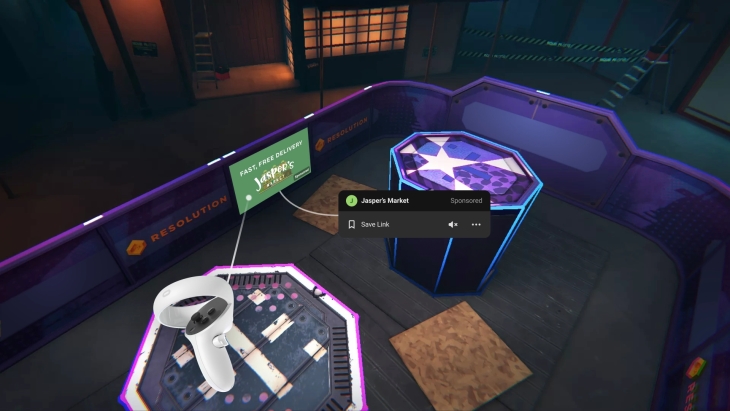
Resolution Games have announced they are removing the test of Facebook’s in-game adverts for Oculus VR games from Blaston; less than a week after it was implemented.
As previously reported, Facebook announced they were testing in-game adverts for Oculus VR devices across a selection of titles. This would begin with Blaston by Resolution Games and “a couple other developers that will be rolling out over the coming weeks.”
Six days later, and Resolution Games have stated (via Twitter) they will be removing the in-game adverts from Blaston. They explain after player feedback, it was clear the game was not “the best fit for this type of advertising.” However, this “small, temporary test” may be moved to their free game Bait! in the future.
“After listening to player feedback, we realize that Blaston isn’t the best fit for this type of advertising test. Therefore, we no longer plan to implement the test. We look forward to seeing you in the arena and hope you try the Crackdown Update that went live today!
To make it clear, we realize that Blaston isn’t the best fit for this type of advertising test. As an alternative, we are looking to see if it is feasible to move this small, temporary test to our free game, Bait! sometime in the future.”
The majority of comments praise Resolution Games for the change, stating they felt Facebook were merely using the studio to promote adverts.
Facebook Reality Labs had previously stated their primary focus is to “bring more people into VR, advance the consumer experience, and make progress on our longer-term augmented reality initiatives.” They are also exploring new ways for developers to make revenue, a key part of creating a self-sustaining platform “that can support a variety of business models that unlock new types of content and audiences.”
This is not the first time in recent months Oculus have had controversial moves thanks to Facebook. Oculus previously announced that users would need to merge their account with a Facebook account from October 2020. Users were not happy, many accusing Facebook of inflating their user numbers via merging accounts (or users having to create new ones), and had concerns over the privacy of the social media platform.
Facebook also confirmed those who violate their Community Standards and have their account banned “may also lose access” to their Oculus games. These violations also included using a fake name or date of birth. Even so, Road to VR reported “the company says that users can choose a pseudonym to associate with their VR activities and maintain a list of VR friends that is separate from their Facebook friends.”
Later, some users were reportedly locked out of their brand new Oculus Quest 2 device for being banned from Facebook, and users having created a new Facebook just for playing Quest 2 being banned with 10 minutes or immediately disabled.
A tweet from Oculus Support stated “We’re aware a small number of customers are having trouble using Quest 2 with their Facebook accounts. If you’re one of the few who’s having trouble getting set up, we’re ready and available to help.” Facebook’s VP of Augmented and Virtual Reality recommended users “make sure their Facebook accounts are in good standing” before buying an Oculus Quest VR headset.
It was later discovered that if users deleted their linked Facebook account, their Oculus purchases were also deleted. Those who own the original Oculus Quest, Rift, Rift 2, and do not plan to link to their Facebook account will be fine. New Oculus headsets such as the Oculus Quest 2 require a Facebook log-in.
In-Game adverts in NBA 2K21 and EA Sports UFC 4 were met with condemnation from their respective communities, with the latter being removed after “feedback” showed it was not welcome.
Image: Facebook
